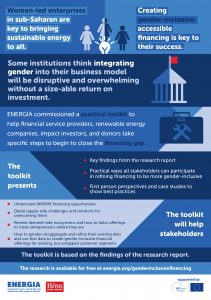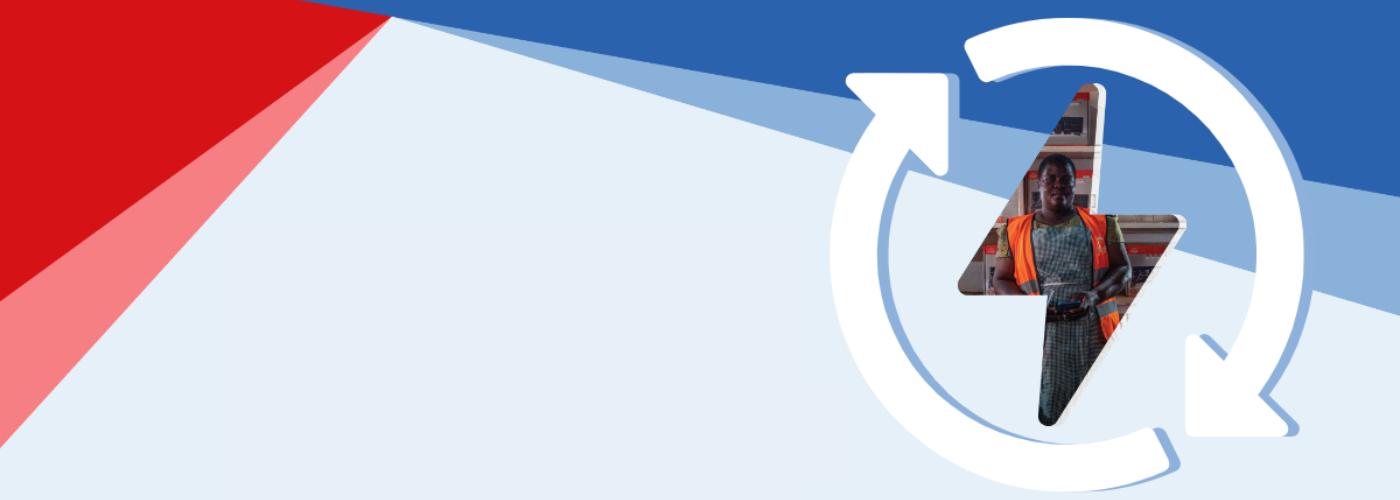Supporting Gender-Inclusive Financing in Last-Mile Renewable Energy Markets in Sub-Saharan Africa: A Digital Toolkit
ENERGIA, supported by GET.invest, commissioned a research report and the development of a practical toolkit focusing on gender-inclusive financing for last-mile renewable energy markets in sub-Saharan Africa.
 According to the International Finance Corporation’s MSME Finance Gap assessment, twenty-six percent of women in Sub-Saharan Africa are involved in entrepreneurial activities and 23% of micro, small and medium-sized enterprises (MSMEs) throughout the world are women-owned. Yet the vast majority of women-owned or led micro, small, and medium-sized enterprises (WMSMEs) lack access to adequate financing that would enable them to grow their businesses. This funding gap exists within the renewable energy sector, although there is little specific data available to quantify the problem.
According to the International Finance Corporation’s MSME Finance Gap assessment, twenty-six percent of women in Sub-Saharan Africa are involved in entrepreneurial activities and 23% of micro, small and medium-sized enterprises (MSMEs) throughout the world are women-owned. Yet the vast majority of women-owned or led micro, small, and medium-sized enterprises (WMSMEs) lack access to adequate financing that would enable them to grow their businesses. This funding gap exists within the renewable energy sector, although there is little specific data available to quantify the problem.
In order to sustainably advance gender-inclusive financing within the renewable energy sector, multiple stakeholder groups—renewable energy companies, financial services providers, international development organizations, impact investors, and donors—must develop a clear understanding of how gender inclusion goes beyond social impact and offers new opportunities for business growth, performance, sustainability, and longevity.
There is a lack of sustainable or scalable financing examples in the sector. Data gaps also limit providers’ understanding of the full market opportunity.
To better understand the challenges and business case related to financing WMSMEs in the last mile of the renewable energy sector, ENERGIA commissioned the development of a toolkit, based on the research report: Building the Business Case for Gender-Inclusive Financing in Last-Mile Renewable Energy Markets in Sub-Saharan Africa. Both the research and the toolkit were designed and created by Distill Inclusion, and supported by GET.invest, a programme that mobilizes investment in renewable energy, supported by the European Union, Germany, Sweden, the Netherlands and Austria.
Laid out as a roadmap for renewable energy companies, financial services providers, international development organizations, impact investors, and donors, the toolkit outlines opportunities and solutions for developing gender-inclusive financial products. Within the toolkit, key players in the industry will find information and practical resources on collecting and leveraging sex disaggregated data, conducting customer research and segmentation for WMSMEs, providing gender-integrated business technical support, and tailoring products and supportive programming to advance women’s entrepreneurship development.
Given that financing is key for expanding access to renewable energy products, equity and inclusion can only be secured once financial service providers, investors, and renewable energy companies understand how and why women entrepreneurs access financing. The toolkit details specific questions, case studies, examples, and exercises for stakeholders who want to work toward offering equitable financing to women entrepreneurs.
Refining their offerings not only opens up new markets for these key stakeholders, but also ensures that WMSMEs and other underserved markets are able to access important renewable energy technologies. Developing completely new products and services is not necessary—instead, stakeholders can utilize customer research to pinpoint how to make refinements in marketing and sales strategies, credit assessment processes, outreach criteria, and/or data analytics to improve finance uptake for WMSME segments.
The toolkit also outlines strategies to help financiers build a solid business case for investing in gender-inclusive financing within the renewable energy sector. This is a key step toward maximizing buy-in and ensuring the longevity of investment, finance offerings, and women’s entrepreneurship in this sector.
Those who use the toolkit will learn about quantifying the financial benefits of being inclusive to the highly underserved market of WMSMEs, as well as how financing this important market segment might affect key business areas such as portfolio quality and customer growth and retention. As illustrated on page 69 within the toolkit, one of the first steps toward building a business case for gender-inclusive financing is to address the widespread gaps in data that currently exist.
For financial services offerings to be more equitable and inclusive, stakeholders need to collect and analyze data that helps inform a more accurate picture of the women’s market.
Contrary to the view that WMSMEs are risky clients, emerging data suggests a strong business case for funding WMSMEs. Additional data needed includes the current level of WMSME participation in the renewable energy sector, sex disaggregated data on business needs and loan performance, further information on the financing gap—broken down by the type of financial product—and an analysis of opportunities for developing the women’s market.
Read through the toolkit to learn more about building a strong business case for gender-inclusive financing within last-mile renewable energy markets in Sub-Saharan Africa.


Follow us on: